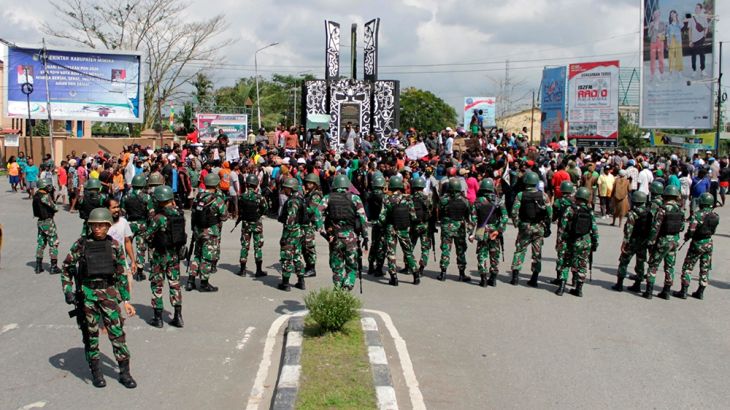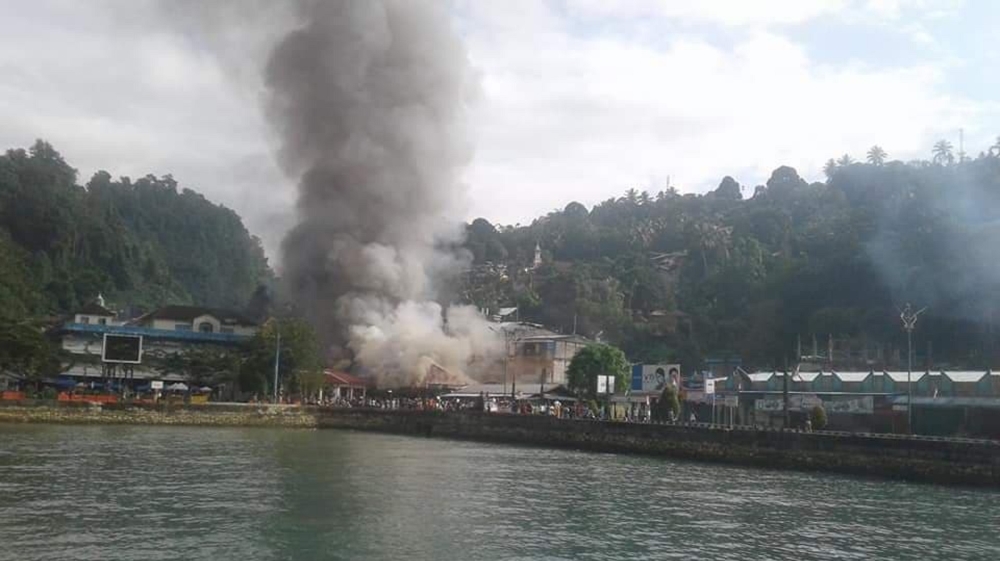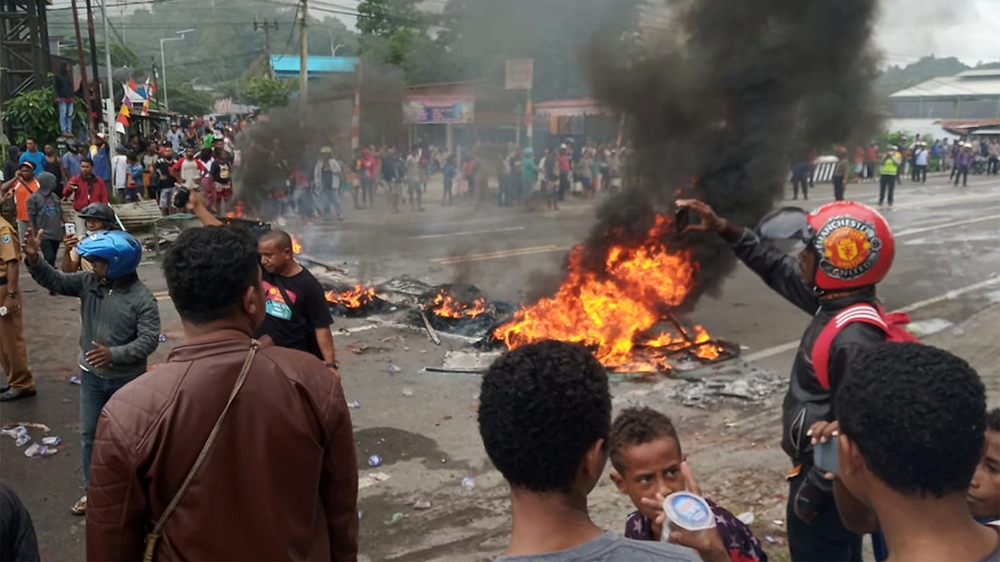Indonesia deploys troops to West Papua as protests spread
At least 300 troops arrive in Manokwari as protests spread with reports of a prison break and airport attack in Sorong.

Jakarta, Indonesia – Indonesia has deployed more troops to West Papua as demonstrations calling for the region’s independence spread.
Government buildings have been torched and reports of unrest belie earlier assurances by the government that the unrest had been contained.
Keep reading
list of 4 itemsIndonesian voters go to the polls to choose a successor to Joko Widodo
‘Disappointed’: Indonesians reflect on legacy of departing Joko Widodo
Voters mull party or family as Indonesian president’s son runs for office
President Joko Widodo‘s chief security minister, Wiranto, told reporters on Tuesday that Jakarta is deploying more forces to West Papua in anticipation of larger protests on Wednesday across the region.
Video obtained by Al Jazeera showed hundreds of military and police personnel arriving in Manokwari, capital of West Papua province and the scene of violent protests on Monday, while Major General Sisriadi, spokesman for Indonesia’s armed forces, told Al Jazeera on Wednesday the military had sent 300 troops to Manokwari.
West Papua comprises the West Papua and Papua provinces and shares an island with Papua New Guinea.
It was a Dutch colony until the early 1960s when Indonesia took it over; becoming part of the country in a controversial 1969 referendum where only some 1,000 people were able to vote.
|
|
An armed rebellion by the indigenous West Papua National Liberation Army has been rumbling ever since.
The region is the poorest in Indonesia, in spite of its natural wealth, and there have been numerous allegations of human rights violations there.
In December, an attack by independence fighters killed at least 17 people and triggered a military crackdown that caused 35,000 civilians to flee their homes as security forces tried to flush rebels out of the mountains.
East Java, where Papuan students faced the mistreatment that set off the protests, is on the main Indonesian island of Java.
Protests continue in spite of calls for calm
Late on Monday, President Widodo had appealed for calm in West Papua, calling on his countrymen to “forgive” and observe more “patience”.
East Java Provincial Governor Khofifah Indar Parawansa also apologised to Papuan students who had been racially abused – reportedly being called “monkeys” – by bystanders and subsequently arrested during a pro-independence demonstration they were holding in the East Java city of Malang.
The anger resulting from the mistreatment of Papuan students is still burning across the region.
Images sent by a source to Al Jazeera on Wednesday showed Papuan protesters in Fakfak, West Papua province, raising their pro-independence flag, a crime under Indonesian law carrying a punishment of up to 15 years in prison.
Another image showed what appeared to be a fire in a coastal area of Fakfak, with reports saying the local market had been set on fire.
On Wednesday afternoon, reports said military and police reinforcements had arrived in Fakfak.
Meanwhile, in Timika, angry protesters took to the streets on Wednesday as soldiers in riot gear and carrying rifles looked on.
On Tuesday, angry protests had spread to at least six areas in West Papua, with reports of injuries.
A female protester was shot in the ankle in Manokwari, according to Victor Yeimo, spokesperson for the West Papua National Committee (WPNC), which initiated and organised the protests.
In Sorong, West Papua province’s largest city, protesters blocked roads and gathered in front of the mayor’s office on Tuesday.

Local media reported that angry protesters destroyed Domine Eduard Osok Airport, forcing airlines to cancel flights to Sorong.
Protesters also set fire to the local prison, which allowed up to 250 prisoners to escape on Tuesday.
Another video obtained by Al Jazeera showed a group of men armed with sticks chasing and throwing rocks at police officers, who were outnumbered. In the video, one officer was seen falling and being hit.
A police officer told Al Jazeera that an officer in Jayapura, the capital of Papua province, had been shot and injured.
Racial slurs, rights abuses
Monday’s demonstrations in West Papua erupted following the arrest last week of ethnic Papuan students living in Surabaya and Malang in East Java.
In Surabaya, the students were accused of throwing the Indonesian flag into a sewer – allegations that they denied in an interview with Suara Papua.
According to local media, a number of mass organisations had gathered at the Papuan student’s dormitory on Saturday – Indonesia’s independence day – to confront them about the alleged defilement.
In the confrontation that ensued, racist abuse was hurled at the Papuan students, including the slurs “monkey, dog, animal and pig”, according to a press release by Amnesty International. Security forces arrived, locking down the students’ dormitory, firing tear gas and arresting the Papuan students.
The police force has said that all the students were returned to their dormitory later that evening and that no arrests had taken place, the students were simply removed for their own safety.
On Thursday, reports of injuries and arrests had circulated after a pro-independence rally held by Papuan students in Malang, East Java. The Amnesty press release recounted how the students were attacked by residents and, shortly after the incident, the deputy mayor of the city threatened to remove the students and return them forcibly to West Papua.
‘Under control’
Mario Christy Siregar, police chief of Sorong regency, told Al Jazeera there were no serious casualties.
“None [was injured]. [Everything is] under control,” he said.
Masih Fak-Fak hari ini. pic.twitter.com/jSH4c4Jsmz
— Febriana Firdaus (@febrofirdaus) August 21, 2019
In an interview with Al Jazeera late on Tuesday, Indonesia’s national police spokesman, Dedi Prasetyo, said the police had observed maximum restraint and no protesters had been hurt.
“None of the police uses any bullet,” he said.
In other parts of West Papua including Nabire, Biak, Bintuni Bay, Kaimana, and Yahukimo, the number of protesters swelled as they shouted: “Papua! Freedom! Papua! Freedom!” and “We are not red and white. We are morning star.”
Red and white refers to the Indonesian flag, the morning star to the political symbol for pro-independence West Papuans.
|
|
West Papuans explained to Al Jazeera why they are joining the rallies, as protests enter their third day on Wednesday.
“The Papuan people continue to protest because they want independence … We believe that only by getting the independence makes our self-esteem equal to other nations’,” said Victor of the WPNC.
On Tuesday evening, Victor had appealed to the international community to monitor West Papua, “especially after the deployment of hundreds of military and police”.
Benny Wenda, chairman of the United Liberation Movement for West Papua, expressed deep concern over the situation of Papuan students in Indonesia.
“Racism goes hand-in-hand with colonisation and repression. Like the black people of South Africa, fighting against apartheid, our struggle against racism is also a struggle for self-determination,” he said in a statement released on Tuesday.
“President Widodo’s words are not enough: Papuans will not stop fighting until we achieve equality, self-determination and a referendum on independence,” added Benny, who is accused by some of being behind the protests.

Internet slowdown
As the unrest continues, the Indonesian government has slowed the internet in parts of West Papua.
Arnold Belau, chief editor of regional online news leader Suara Papua, said the internet in Jayapura has been off since Monday.
|
|
Communications and Information Minister Rudiantara told Al Jazeera that the government applied a “throttling mechanism” to filter information and prevent the spread of rumours during the protest.
Rudiantara explained that throttling was only being applied in three areas – Jayapura, Manokwari and Sorong – between noon and 8pm.
“We need to do that not only due to the national security but also to avoid hoax from spreading to provoke (the masses),” he argued.
Throttling is an intentional slowing of the internet by service providers.
Rudiantara also teamed up with national police to examine postings on social media. Police said they found two social media accounts they believe provoked the riots in Manokwari.
The ministry’s site published some of the alleged hoaxes they thought had contributed to stirring anger. One of these so-called hoaxes was a post by human rights lawyer Veronica Koman, who focuses on West Papua issues, on the arrest of two Papuan students in Surabaya, East Java.

The ministry came under fire after the public realised that Veronica’s tweet had been misquoted, changing her use of the word “arrested” to “kidnapped”. She is publicly seeking an apology from the ministry.
Veronica has said that the throttling measure is a violation of the West Papuan people’s right to freedom of expression and access to information, rather than a measure to limit the spread of hoaxes.
With the internet blocked, people are only able to access television, meaning Jakarta can control the narrative, added Victor, the WPNC spokesperson.
